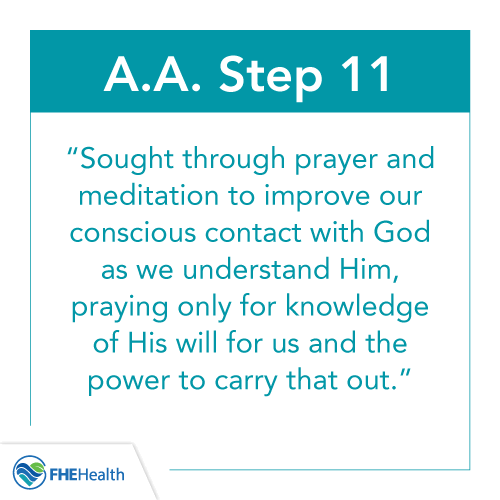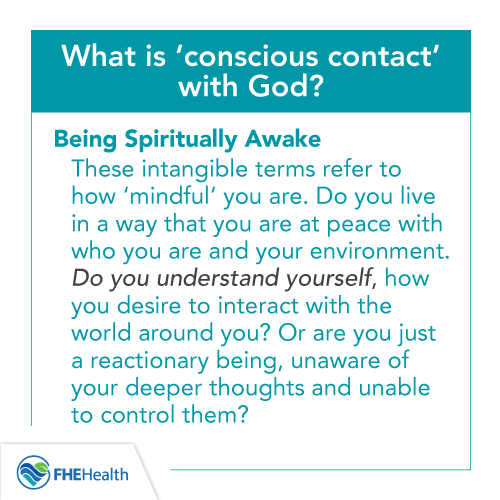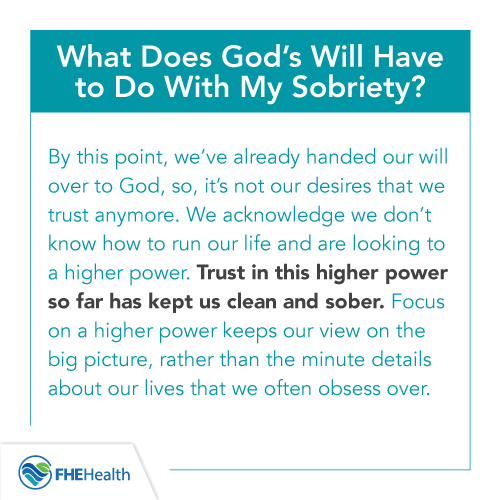
|
|
Updated July 19, 2023
In Step 10 the 12 steps of programs like Alcoholics Anonymous and Narcotics Anonymous, you’re taught the value of looking internally and trying to react to the world with grace and humility. This makes Step 11 a natural next phase in recovery. After finding the grace to admit your wrongs, this motif of humility continues as you embrace and deepen your connection with a higher power.
Like anything based on the concept of “God,” Step 11 may make some people skeptical about whether the 12-steps can help them. Here’s a discussion of what Step 11 is and why it’s important to complete, both on its own and as part of the larger, 12-step journey to recovery from addiction.
What Is the 11th Step of AA?
 Step 11 is formed around the following quote from the AA handbook, also known as The Big Book:
Step 11 is formed around the following quote from the AA handbook, also known as The Big Book:
Sought through prayer and meditation to improve our conscious contact with God as we understand Him, praying only for knowledge of His will for us and the power to carry that out.
This is the 11th Step, the mantra of those who reach this stage in the process of recovery. What it means is this: When you deepen your connection to God, you are given the strength you need for lifelong recovery.
Step 11 is significant because, in a way, it’s the final step, at least if you’re viewing the process from the standpoint of internal growth. Step 11 is often described as the final phase of complete spiritual awakening, and in Step 12, it’s time to spread the word of AA to others in need. Truth be told, these aren’t really steps that you ‘complete’ as much as you begin living them, every day!
Why Is Step 11 So Important?
Step 11 is crucial because it’s where the 12 Steps’ themes of humility and faith come together. There are a few reasons why those who are living “the program” see Step 11 as being a crucial part of the process:
“Trust the Program”
Many long-time AA members don’t just put faith in the spiritual aspects of AA; they trust the program itself. They see that they’ve come too far to stop now or lose faith, and even those uncomfortable with prayer ought to give Step 11 a shot.
It Puts Us in Perspective
No matter what you believe in, humility is a major part of recovery. After all, the first step to being successful in quitting your addiction to drugs or alcohol is to admit you have a problem. Admitting something that you recognize as a flaw in yourself can be a humbling experience.
When you have the inner strength to accept that you aren’t the most important thing in your life and put credence in a higher power, you keep focused on the bigger picture. It helps you understand the importance of your goal, without getting wrapped up in excuses and pity for yourself.
“Pray Without Ceasing”
Many people associate Step 11 with a Bible verse found in 1 Thessalonians 5:16-18:
Rejoice always, pray without ceasing, give thanks in all circumstances; for this is the will of God in Christ Jesus for you.
Of course, “pray without ceasing” shouldn’t be taken so literally as to think you should never get off of your knees. What this verse means is that you should keep God, or your chosen higher power in mind at all times. Live in a way that is in constant reflection of this meditation. In the context of Step 11, this verse reminds those in recovery to maintain humility and focus on their goal, no matter what challenges they may come up against.
What if I’m Agnostic?
 But we recoiled from meditation and prayer as obstinately as the scientist who refused to perform a certain experiment lest it prove his pet theory wrong.
But we recoiled from meditation and prayer as obstinately as the scientist who refused to perform a certain experiment lest it prove his pet theory wrong.
This is a phrase from within Chapter 11 that addresses a common concern in AA. Many addicts don’t have prior experience with religion or moved away from it during the dark times of their addiction. This was likely a struggle in step 2 as well, where we admit there is a higher power than ourselves.
This may cause some AA members to recoil when told to lay bare their conscience before God and humble themselves. The above quote basically means, “Most people who haven’t gotten something positive out of prayer or meditation haven’t tried it before.”
At the core of AA’s ‘higher power’ is the need to appreciate that the universe does not begin and end with you. That you are not the most powerful and best decision maker that has ever existed. Asked point blank, most people would acknowledge that, but how often do you live your life as if you believe that? Do you pray and meditate on that? AA doesn’t ask that you accept the Christian God, the Jewish G-d, or the God of Islam. It asks that you look to something, anything, that is ‘higher’ than yourself.
It’s this fear of letting a higher power into your life that can keep you from completing the program and, as many AA members feel, what’s the harm in opening up your mind to something that can help you?
Step 11: Mindfulness and Meditation
 Each person working AA may have a different way to practice step 11. It should help them center themselves, remember their priorities and core beliefs, and refocus their attention for better decision-making.
Each person working AA may have a different way to practice step 11. It should help them center themselves, remember their priorities and core beliefs, and refocus their attention for better decision-making.
The goal of step 11 should be to a continuous march toward spiritual improvement. It can be a challenge, though, to actually measure that improvement. An excellent way to do it is through journaling. Through journaling (which is in itself a form of meditation) you are able to express your thoughts, struggles, and honesty. They can also be used to look back on to see the challenges and hurdles you have overcome.
Other people may use a ‘mantra’ in their work of step 11. Many of the common AA mantras work well for this. Telling yourself ‘One day at a time’, for example, may remind you how much time you have spent in the program, what you’ve accomplished so far, that you only have to worry about your sobriety today, not tomorrow. A repeated reaffirming statement that reminds you about who you are, and your place in the world, maybe the most beneficial way for you to practice meditation.
The more obvious route may be to make a routine of prayer. Getting on your knees in the morning and at night (at least!) is a habit that can keep you mindful of your behavior and mindset. There is a danger in turning anything into a routine, but even that can be exposed through honest soul-searching during meditation!
The following questions may help individuals tackle Step 11 and facilitate valuable self-reflection throughout the recovery journey. As you read through them, answer them honestly. Then, make goals to improve your answers during your recovery journey.
- How has my understanding of a higher power changed since beginning my step program?
- Do I have a spiritual path? How will it likely contribute to my recovery?
- What is the difference between a spiritual path and a religious one?
- What have I done to explore my spiritual life?
- How does meditation and prayer help me put my life and thoughts into perspective?
- How has prayer and meditation wrought changes in my life?
- At what times do I notice a higher power’s presence in my life? What does a higher power feel like?
- What have I done to improve my contact with the Divine?
- What are some situations or circumstances when I have tried to align my will with the will of God? What were the results?
- Why should I pray for God’s will to govern my life and for me to develop the power to carry out God’s will?
- How can I show my commitment to achieving the 11th goal in my 12-step program?
- Was I able to meditate or pray today? Have I done so this week? Do I have faith that God will give me the power to carry out his will?
Answers to these questions will help you identify your struggles with step 11 of your AA program. Achieving all your program steps is a major accomplishment that promotes lasting recovery. Step 11 can be a difficult one as many individuals struggle to initiate or maintain a spiritual connection.
If the spiritual portion of your AA program is a stumbling block, be sure to discuss your struggles during group meetings. Talk to other program participants about how they approach this step and what they’ve done to work through it. Be sure to ask yourself these 11 questions when you first get to step 11. Then, revisit them as you work through the step. How have your answers changed or improved during the course of your work with the step? You’re apt to see improvement with time and dedication.
Your AA group can help you achieve this and other steps. Be sure to rely on them for assistance working through step 11 as well as other steps in the program.
How Can I Make Sure I’m Doing Step 11 Right?
Step 11, unlike some of the other steps, is a hard one to verify. Step 9, for example, involves making amends to those you’ve wronged. After spending time making a list of everything you need to make amends for, this isn’t a difficult step mark as ‘complete’. But ‘Improving communication’ is an intangible task that can be difficult to measure.
It’s recommended that when exploring how to do the 11th step of AA, it comes down to what works best for you. Some people choose to sing, speak or write their prayers, and others choose to pray internally and wait for an answer from a higher power.
This step should be worked through with a sponsor. It’s likely going to take a lot of preparation and deep reflection about what prayer and meditation mean to you before you begin.
- Why the 12-step Program Still Works
- Step 1: Why the 12-step Journey Begins with Powerlessness
- Step 2: What is a Higher Power?
- Step 3: God as you Understand Him
- Step 4: Your Moral Inventory
- Step 5: Admitting Your Wrongs
- Step 6: Addressing Character Defects
- Step 7: Removing our Defects
- Step 8: Willing to Make Amends
- Step 9: Making Amends, How to Approach Step 9
- Step 10: Ongoing Inventory
- Step 11: How to Deepen Your Connection with a Higher Power (This Blog)
- Step 12: Sharing Your Spiritual Awakening With Others
- Understanding AA Lingo
- The Principles of AA






